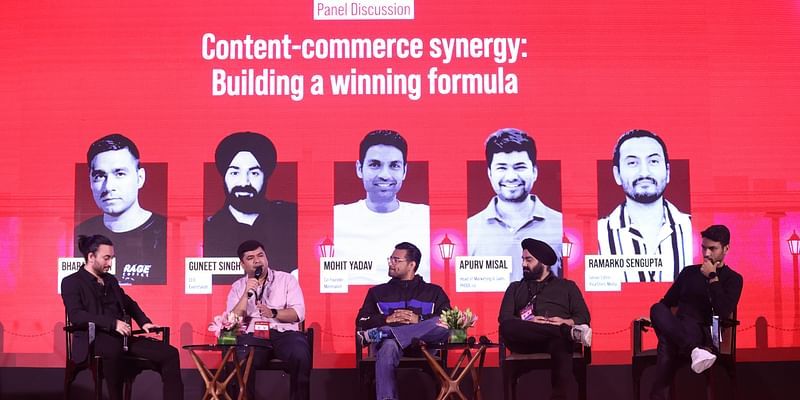
At the D2C Playbook track during TechSparks 2023 Delhi edition, a panel of D2C founders engaged in an insightful conversation centred on the fusion of content and commerce. The discussion delved into strategies adopted by Direct-to-Consumer (D2C) players and the significance of integrating content with commerce in today’s dynamic market.
Are you telling the story right?
Bharat Sethi, Founder and CEO of Rage Coffee, kicked off the dialogue by emphasising the significance of storytelling in brand building. He highlighted the essence of brand storytelling in creating a connection with consumers in an era where choices abound.
According to Sethi, “Visual media stands at the forefront of effective storytelling, making content the cornerstone of brand development.”
Apurv Misal, Head of Marketing and Sales at PHOOL.co, shared the company’s journey of leveraging design illustrations to convey the fragrance of their products. Misal highlighted the power of storytelling by sharing an anecdote, “Initially when we were low on budgets for marketing, we created paperboat style illustrations with a nostalgic memory associated with it. For example, Nani k aangan ki khusboo which was tulsi; this led to a substantial increase in followers.”
Educational content adds value
Emphasising the role of educational content in creating awareness among consumers, Mohit Yadav, Co-founder of Minimalist, said “Educating consumers about product benefits and dispelling myths around certain ingredients has been our focus. Also, user-generated content (UGC) to showcase success stories builds trust and authenticity.”
Guneet Singh, CEO of Everstylish, outlined two primary categories of content strategies—educational content that adds value to customers by teaching them new things, and entertaining content that showcases the brand’s fun side. Singh emphasised the importance of making the brand relatable and enjoyable for users.
The panel also discussed the democratisation of brand building, enabling companies to create content in-house and leverage platforms to connect directly with audiences. They highlighted the impact of relatable content creators on influencing consumer decisions, often surpassing the impact of paid influencer endorsements.
When discussing the role of AI in storytelling, panellists opined that while AI has its merits in certain areas of content creation, its impact might not be substantial in visual storytelling, at least in the short term. They emphasised the need for authenticity and personalisation, predicting a surge in local content creation tailored to specific audience segments.
Content – Commerce Synergy
Addressing the challenges of measuring Return on Investment (ROI) in content creation, panellists stressed the importance of clear objectives and brand alignment. While measuring the true impact of content can be challenging, they backed leveraging perceived value arbitrage and focusing on building brand resonance as key indicators of success.
Concluding the discussion, the panellists offered valuable advice for early-stage D2C founders, emphasising the importance of authentic storytelling, building internal content creation teams, avoiding vanity metrics, and prioritising customer acquisition through genuine brand narratives.






![Read more about the article [Funding alert] Paytm-backed Fable Fintech raises undisclosed amount in Series A round](https://blog.digitalsevaa.com/wp-content/uploads/2021/06/Imagegufr-1622723644647-300x150.jpg)



